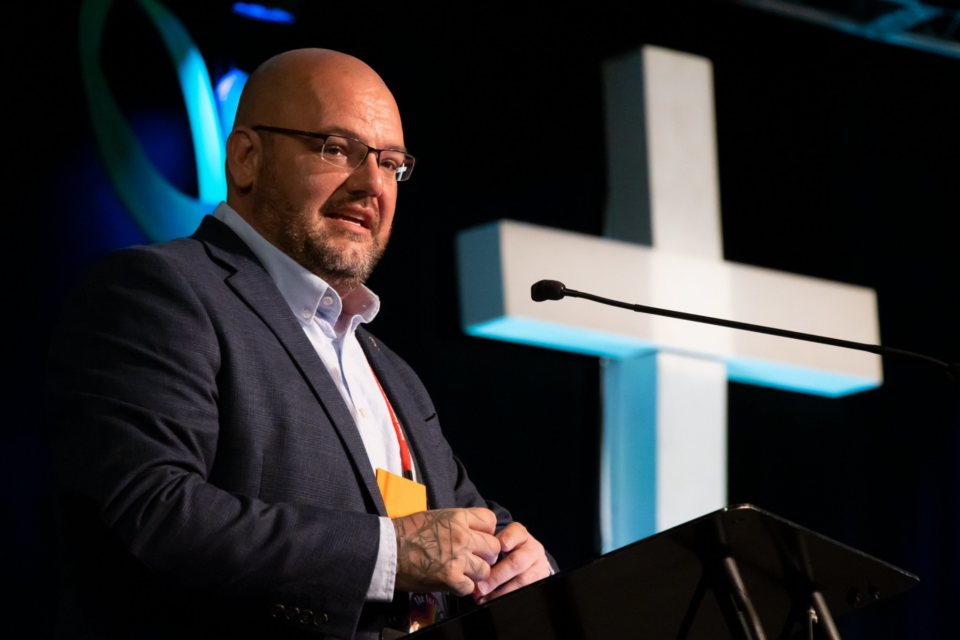In this op-ed, Rev. Jeremy Wicks says eligible voting members should vote yes on the proposed constitutional amendment to Paragraph 35, Article IV (Ballot #4), because it focuses on clarity, consistency, and theological accountability across our global church.
REV. JEREMY WICKS
Chair, Fellowship of Local Pastors and Associate Members, Michigan Conference
One thing I’ve learned in ministry — and life — is that clarity is a form of kindness. When we’re clear about what we expect, what we believe, and how we make decisions, we create space for trust and health in our relationships and communities. That’s true in families, churches, and, yes, even in the way we organize ourselves as a denomination.
With that in mind, I’m supporting the proposed constitutional amendment to Paragraph 35, Article IV, which will come before our Michigan Annual Conference this year. It’s one of four amendments eligible lay members and full-member clergy will be voting on, and while it might seem small and technical, it carries real significance. Click to learn more about Ballot #4.
This amendment clarifies who can vote to elect clergy delegates to general and jurisdictional conferences. The language in Paragraph 35 previously said that clergy voters must have completed “a course of study or an M.Div. degree.” That’s now being updated to say: “course of study or Master of Divinity from a University Senate-approved theological school or its equivalent as recognized in a Central Conference . . . .”
This change doesn’t expand or limit who can vote, it just clears up what we mean by “master of divinity (M.Div.)” — making sure it refers to a degree from an institution approved by the University Senate, or an equivalent institution internationally.
And that kind of clarity matters.
In a global denomination like ours, people enter ministry through many different paths — some complete seminary, others go through the Course of Study. That diversity is a strength, but it also means we need to be crystal clear about what qualifies someone to participate in certain roles and decisions, like electing delegates who help shape the future of our church, including electing our episcopal leaders.
This amendment does just that. It makes sure that when we say someone has an M.Div., we’re all talking about the same standard — one that aligns with the expectations already used by the General Board of Higher Education and Ministry and Boards of Ordained Ministry across the connection.
When asked to write about this amendment, I’ll be honest, it gave me pause. After all, as a licensed local pastor who has completed the Course of Study, I don’t have the right to vote on constitutional amendments — that responsibility is reserved for clergy in full connection. And even though this amendment doesn’t directly affect me — and I can’t cast a vote — I still support it wholeheartedly.
Why? Because I care about the integrity of our processes, I believe in consistency, and I understand holding to our shared standards helps us all move forward together with trust and confidence.
This amendment doesn’t rank ministry paths or question the value of one educational route over another. It affirms both the Course of Study and the M.Div., and at the same time, it recognizes that not all M.Div. degrees are the same — and it’s important to name that. With the wide range of programs out there, it matters that we’re clear about what qualifies under our United Methodist standards.
When our rules are vague, people get confused. Sometimes they feel excluded or blindsided, and that’s never what we want. This small update brings clarity, and that is one of the most compassionate gifts we can offer one another.
So to my siblings — especially those who are lay and clergy in full connection and have a vote — I encourage you to support this amendment to Paragraph 35. It’s not about restricting access or gatekeeping. It’s about clarity, consistency, and a shared commitment to theological accountability across our global church.
Sometimes the kindest thing we can do is make sure the language we use truly reflects the values we hold. That’s what this amendment does. And I’m grateful for the chance to support it — even if I won’t get to raise my placard when the vote is called.
Rev. Jeremy Wicks is executive pastor at United Methodist Ministries of Mecosta County. As chair of the Fellowship of Local Pastors and Associate Members, he provides leadership and support for licensed local pastors and associate members. He serves as a member of the Board of Ordained Ministry and sits on its Executive Committee, ensuring that the voices and experiences of local pastors and associate members are represented in key decisions about clergy credentialing, formation, and support across the conference.
Last Updated on April 15, 2025

